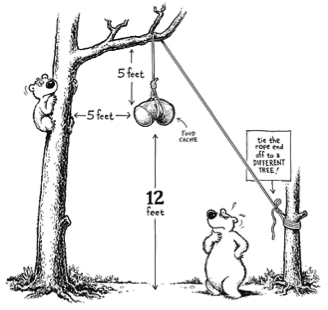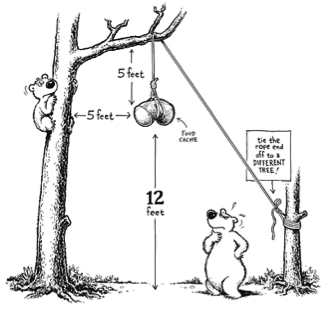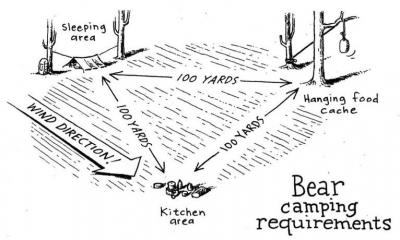Skills & Techniques
3 Ways to Prevent Bear Attacks!


Kernville, CA: Did you know that “bears are proficient at climbing, swimming and running at up to 35mph,” according to the American Bear Association. This means that it is very important that we take the steps necessary to minimize our contact with bears. Below we have listed 3 ways that you can avoid bear attacks by practicing Leave No Trace. Please by aware that encounters with bears can be unpredictable and the methods listed below are NOT full proof; a bear can attack at any time!
3 Ways to Prevent Bear Attacks:
- Contact the area you are visiting for any specific wildlife considerations.
- You will want to know if you need a bear canister or will need to know how to do a bear hang, and what is the preferred method is.
- Bear bags should be hung 12 feet off the ground, 6 feet away from the tree and the branch it is hung off of.

- Bear bags should be hung 12 feet off the ground, 6 feet away from the tree and the branch it is hung off of.
- Ask what precautions, such as bear spray, are necessary for protection from bears.
- It is also good to know if there has been any recent bear activity in the area, and what tips they might have for minimizing contact.
- You will want to know if you need a bear canister or will need to know how to do a bear hang, and what is the preferred method is.
- Become familiar with bear behavior and signs of activity.
- Avoid packing fragrant foods and fragrant nonfood items.
- Bring a trash bag to pack out waste and leftover food.
- Take a flashlight and binoculars with you on your adventure.
2. Proper Campsite Selection
- Choose a campsite in an open area, as opposed to a densely covered area or natural pathway. This makes it easier for you to detect a bear’s presence and for the bear to detect you.
- Use the “bear”muda triangle.
- Your kitchen, sleeping area and food storage should all be 100 yards apart, in the shape of a triangle.

- Your kitchen, sleeping area and food storage should all be 100 yards apart, in the shape of a triangle.
- Make sure your “kitchen” is downwind (preferably 100 yards) from your tent.
- Choose to sleep inside your tent and not under the stars.
- Make sure no smellables are left in your tent overnight. Avoid storing smelly items in your tent in general.
- Always put away (properly store) food scraps and garbage.
- Wash dishes and cooking utensils directly after use and store downwind of tents.
- If moving around at night, be extra cautious and use a flashlight.
- Always observe wildlife from a distance and use the rule of thumb.
- Control pets at all times or leave them at home.
- Bears don’t like surprises! Be cautious when traveling around blind corners, in windy conditions, by loud water, etc.
- Make noise while you’re hiking – talk to people in your group, bring a whistle, consider clapping or singing.
- Hike in groups (preferably 4 or more) and stay together.
- Stick to trails and avoid hiking during the night.
Enjoy your world! Leave No Trace and try not to get eaten by bears!
Helping keep our wild spaces wild,
Jenna and Sam – Subaru/Leave No Trace Traveling Trainer Team West
Leave No Trace’s Jenna Hanger and Sam Ovett are part of the 2016 Subaru/Leave No Trace Traveling Trainer Program that provides free, mobile education to communities across the country. Proud partners of this program include Subaru of America, Deuter, Eagle’s Nest Outfitters, Smartwool, and REI.
References: http://www.americanbear.org/education-awareness/hiking-camping/
Related Blog Posts
Let’s protect and enjoy our natural world together
Get the latest in Leave No Trace eNews in your inbox so you can stay informed and involved.

